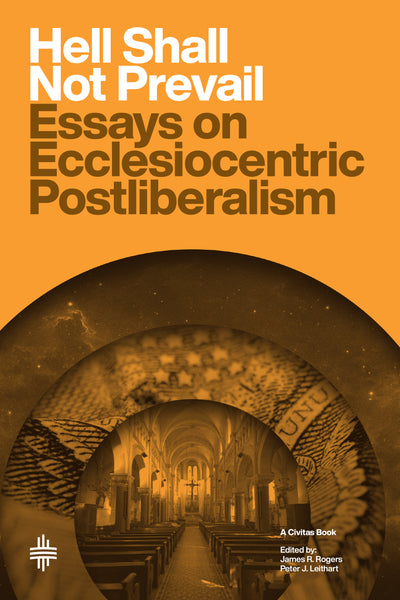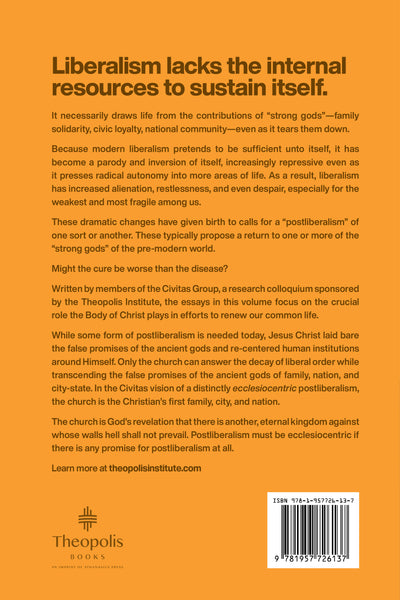Hell Shall Not Prevail: Essays on Ecclesiocentric Postliberalism
Written by members of the Civitas Group, a research colloquium sponsored by the Theopolis Institute, the essays in Hell Shall Not Prevail: Essays on Ecclesiocentric Postliberalism focus on the crucial and distinctive role of the Body of Christ—the church—for renewing our political, social, and economic life together.
Liberalism lacks the internal resources to sustain itself.
It necessarily draws life from the contributions of “strong gods”—family solidarity, civic loyalty, national community—even as it tears them down.
Because modern liberalism pretends to be sufficient unto itself, it has become a parody and inversion of itself, increasingly repressive even as it presses radical autonomy into more areas of life. As a result, liberalism has increased alienation, restlessness, and even despair, especially for the weakest and most fragile among us.
These dramatic changes have given birth to calls for a “postliberalism” of one sort or another. These typically propose a return to one or more of the “strong gods” of the pre-modern world.
Might the cure be worse than the disease?
Written by members of the Civitas Group, a research colloquium sponsored by the Theopolis Institute, the essays in this volume focus on the crucial role the Body of Christ plays in efforts to renew our common life.
While some form of postliberalism is needed today, Jesus Christ laid bare the false promises of the ancient gods and re-centered human institutions around Himself. Only the church can answer the decay of liberal order while transcending the false promises of the ancient gods of family, nation, and city-state. In the Civitas vision of a distinctly ecclesiocentric postliberalism, the church is the Christian’s first family, city, and nation.
The church is God’s revelation that there is another, eternal kingdom against whose walls hell shall not prevail. Postliberalism must be ecclesiocentric if there is any promise for postliberalism at all.
Learn more at theopolisinstitute.com
ABOUT THE CONTRIBUTORS
Andrew K. Bobo
Andrew K. Bobo is a Ph.D. student of Politics in the Institute of Philosophic Studies at the University of Dallas. He holds a Th.M. from Dallas Theological Seminary and an M.P.A. from the Bush School of Government at Texas A&M University. He serves as Associate Executive Pastor, Practical Theology at First Baptist Dallas. Andrew and his wife, Ana, have four children.
Peter J. Leithart
Peter J. Leithart is President of the Theopolis Institute, a Christian think tank, Birmingham, Alabama, and organizing pastor of Immanuel Reformed Church. He completed seminary studies at Westminster Theological Seminary, Philadelphia, and earned his Ph.D. from the University of Cambridge (1998). He is a contributor to First Things and Touchstone magazines, and has published articles in several academic journals, including the Journal of Biblical Literature, Modern Theology, Pro Ecclesia, and the International Journal of Systematic Theology. He is the author of many books, most recently, On Earth as in Heaven (Lexham, 2022) and Creator (IVP, 2023). Peter and his wife, Noel, have ten children and sixteen grandchildren.
Ben Peterson
Ben Peterson is an assistant professor of political science at Abilene Christian University. He teaches courses on American government and politics, research methodology, and political theory. He has published research on comparative political theory and American political thought. His essays have appeared in numerous outlets, including Law & Liberty, Public Discourse, and National Affairs.
David Reiter
David Reiter is Professor of Philosophy at Erskine College in Due West, South Carolina. He holds degrees from the University of Nebraska-Lincoln (Ph.D.), Westminster Seminary in California (M.A.R.), and Covenant College (B.A.). His main interests are in philosophy of religion, epistemology, Christian apologetics, and political theology. Reiter’s published work has appeared in Ars Disputandi, The Confessional Presbyterian, Erkenntnis, Faith and Philosophy, Journal of Philosophical Research, Origins and Design, and Philosophia Christi. He and his wife, Carla, are members of Clemson Presbyterian Church.
James R. Rogers
James R. Rogers is Associate Professor of Political Science at Texas A&M University and Contributing Editor at Law & Liberty. He holds a J.D. and a Ph.D., and teaches and publishes at the intersection of law, politics, and game theory. He has published articles in the American Journal of Political Science; the Journal of Law, Economics, and Organization; Public Choice; and in numerous other scholarly journals. He edited and contributed to the book Institutional Games and the Supreme Court and served as editor of the Journal of Theoretical Politics from 2006 through 2013.
Gary Young
Gary Young is partner in the law firm of Keating, O’Gara, Nedved and Peter, P.C. in Lincoln, Nebraska and a Harold W. Kauffman Fellow at the University of Nebraska College of Law, where he has served as an Adjunct Professor of Law since 1996. He holds a J.D. from the University of Nebraska (1995) and B.A. in Politics from Brandeis University (1989). Young served as Judicial Law Clerk to the Nebraska Supreme Court from 1995 to 1997. Young served as Executive Editor of the Nebraska Law Review and has had articles published in the Notre Dame Journal of Law, Ethics and Public Policy; the University of Missouri-Kansas City Law Review; and Regent University Law Review.




